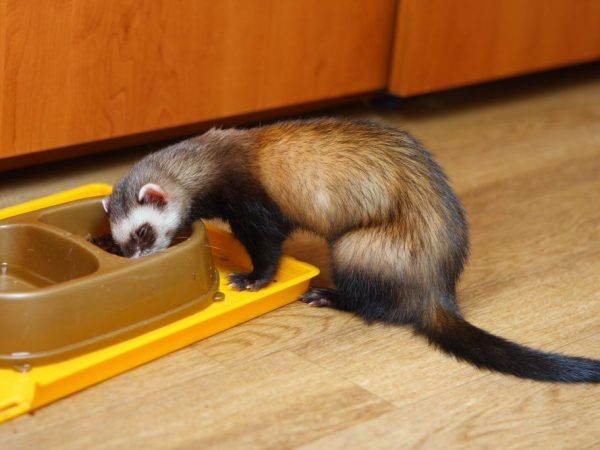How long do ferrets usually live?
Today, the trend for unusual pets is returning to fashion. So, on the street you can see the owners with raccoons, ferrets, jerboas. The article provides an answer to a popular question among owners: how long do ferrets live?

Ferrets' lifespan
General information
The ferret is a mammal of the weasel genus. Sharp-sighted and dexterous, this animal is a born hunter. As soon as it gets dark, the ferret goes hunting. The predator feeds on voles, ground squirrels, frogs, insects, etc. It is important for him to have his own shelter, which, however, he rarely digs on his own. It settles and lives in hollows, haystacks, burrows of other animals, in buildings such as sheds and cellars.
The domestic ferret (ferret) was bred from the forest at the beginning of our era in Europe. Appreciating the agility and hunting instinct of the animal, man pursued the goal of getting a catcher of mice and rats. Interestingly, this species is often confused with ermines.
If you try to domesticate a ferret found in natural latitudes, you will not succeed.
The rules regarding nutrition and training to be followed in order for the ferret to live as long as possible are discussed below. Do not forget: it is important not only how long the ferret lives, but also the quality of his life.
Average indicators
On average, ferrets live with a person for about 8-9 years, maximum - 15. For comparison: a wild one hardly crosses the 5-year line. This is due to the natural conditions in which he lives, enemies - larger predators, lack of food, parasites. For as many years as domestic ferrets live, wild can not hold out.
The owner must provide care for the ferret.
No living creature is immune from sudden death. It is in the power of the owner to provide everything necessary so that his pet stays with him as long as possible. How many years ferrets live in captivity depends largely on the conditions that are created for them.
Factors affecting life expectancy
What factors affect how long ferrets live in captivity?
- Heredity. If both parents of your pet died a natural death, having lived no more than ten years, then he is unlikely to become a long-liver. Experienced breeders select genetically healthy individuals for mating ferrets.
- Lactation. Every mammal in the early period of life needs breast milk, and the ferret is no exception - this is how nature works. Lack of milk can lead to a lack of calcium in the body and contribute to the development of rickets in the animal. This disease will negatively affect the quality and longevity of the pet. There are medicines for this case, but it should be remembered that any disease is easier to prevent than to cure.
- Safety regulations. The pet should be allowed to walk only in a specially designated area. Small and nimble, it can get into the stove, get tangled in the wires. Small children should not be allowed to torture an animal.
- Vaccination. Do not neglect this event, because more than half of unvaccinated pets fall ill with the plague, Aleutian disease or rabies.You don't have to be in contact with other animals to get infected.
Human beings are also susceptible to diseases like rabies.
In addition to the main vaccines, ferrets are given additional, anti-infectious ones: from hepatitis, enteritis, leptospirosis, adenovirosis.
Correct care
We are responsible for those we have tamed. An animal is not a toy, it requires, like a child, that efforts be invested in its maintenance and upbringing, and therefore care for it must be appropriate. You can't feed the ferret with whatever you have to. The basis of the diet should be a raw rabbit, turkey, offal, chicken, trout, buckwheat, low-fat cottage cheese, quail eggs, vegetables, special vitamin complexes.

Ferret nutrition
The lack of the necessary minerals in the ferret's diet leads to the development of gastrointestinal diseases, vitamin deficiency, decreased immunity, and hair loss. Drinking water should always be clean. It is necessary to ensure that the prohibited product does not get to the rodent, because even a small piece of junk food can cause food poisoning in the beast. It was noted that ferrets eating dry food were more likely to have cancers. It is important to feed your pet natural food.
You cannot feed the animal in a closed cage for days: this negatively affects its physical and mental health. You need to regularly arrange walks and outdoor games. We must not forget about training and muscle stress. The ferret is a friendly animal, inquisitive and easy to contact, so it needs attention and feedback from a person.
It is necessary to observe the rules of hygiene of the animal, regularly carry out wet cleaning in the room where the rodent lives, ventilate, change the bedding.
Conclusion
Now you know how long ferrets live at home. Ferret life in a human's home can be just as interesting for him as in nature, and certainly not as dangerous. A domestic rodent, as mentioned above, lives a longer period than a wild one.
As much as you love your pet, it is important to understand that no one is left on earth forever. But only the owner can make his life as full as possible and as long as possible. Domestic ferrets can have a lifespan of over 10 years. Proper nutrition, proper care, training of ferrets, adherence to safety rules are all easy.



